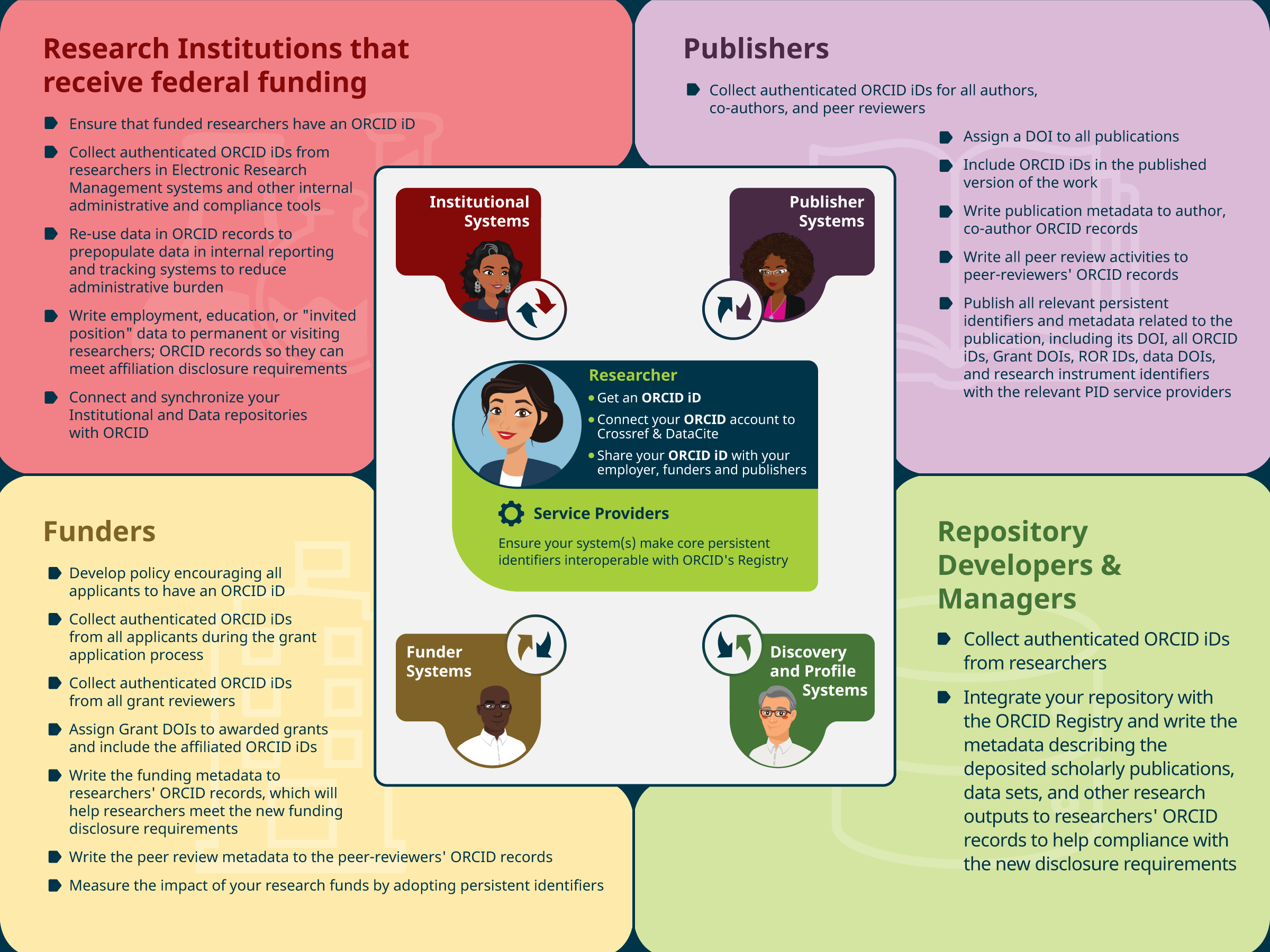
When ORCID set up its vision of “a world where all who participate in research, scholarship, and innovation are uniquely identified and connected to their contributions across disciplines, borders, and time,” we understood that meeting the practical realities of this vision would require both the technical underpinnings of the infrastructure we provide, as well as community buy-in to encourage wide adoption and practice. The past few years has seen an acceleration of the latter as persistent identifiers such as ORCID IDs have been incorporated into multiple national science and open research strategies around the world. Recent impactful memos published by the United States Office of Science and Technology Policy (OSTP), part of the Executive Office of the President, contribute to this body of policies by encouraging the adoption of persistent identifiers to enhance public access to research and improve research security. ORCID is encouraged by the potential of these recommendations to positively impact research integrity and public accessibility and by the fact that the infrastructure ORCID provides can help the research community as they update their workflows and public access policies to meet the new requirements.
On 14 January, 2021, the OSTP first signaled its support for persistent identifiers in a Presidential Memorandum on the topic of Research Security, now commonly referred to as NSPM-33. This memo gives direction to the major US Federal funding agencies which includes the adoption of persistent identifier (PID) infrastructure as an important way of enabling researchers to be transparent about their research activities while reducing administrative burden. The NSPM-33 Guidance published a year later further described the role and expectations of funders in adopting persistent identifiers and listed the standards that a PID service for researchers must meet to be included in Federal grant application processes. ORCID is the only organization that currently satisfies all of these criteria.
Fast forward to 25 August, 2022, when OSTP published a subsequent memo that is expected to have lasting impacts on the research community. The memo, titled “Guidance to Make Federally-Funded Research Freely Available Without Delay”—also known informally as the “Nelson memo” or the “Public Access memo”—has implications reaching far beyond the US citizens it was designed to address.
In this article we discuss the new requirements that NSPM-33 and the Nelson memo levy on research funders, universities and research institutions, and researchers themselves. We cover how these requirements will improve the integrity and trustworthiness of research, and perhaps most importantly, the potential of the openness and transparency reflected in the requirements to help the world meet the ever growing challenges of the 21st century.
We then go on to describe the ways in which ORCID and other PID service providers ease compliance with the new requirements while also reducing the administrative burden on researchers. We close with an extensive list of best practices for each of our stakeholder groups, along with an infographic for quick reference, so click here if you’d like to jump straight to that.
ORCID helps fulfill research security requirements in NSPM-33
The intent of NSPM-33 is to maintain open and collaborative research practices with international partners, enabling research findings to be shared openly so the world can grow together, while protecting against exploitation by governments that do not exhibit a reciprocal dedication to open scientific exchange. With the new requirements, researchers who receive federal research funding or participate in the process of awarding federal research funding will be asked to transparently disclose their professional associations with research-related and other institutions. To help accelerate adoption of the new requirements, NSPM-33 instructs the major federal funding agencies to adopt Digital Persistent Identifiers (DPIs) to help streamline their reporting processes and reduce administrative burden on researchers, a major focus of the guidance.
In NSPM-33, the OSTP defined DPIs as, “A digital identifier that is globally unique, persistent, machine resolvable and processable, and has an associated metadata schema.” These are more commonly referred to as PIDs (Persistent IDentifiers) in the scholarly communications community
Policies from the major US federal funders on how they intend to to meet the NSPM-33 requirements are expected in early 2023. It is likely that the agencies will coordinate their disclosure requirements with each other and align their systems so that researchers have a more uniform experience when applying for funding from different agencies. Forms will be pre-populated so researchers can simply review and edit their data for each application instead of rekeying all of it manually time and time again. Much of the required data about a researcher’s professional associations to enable this functionality can be found in their ORCID record.
Making research publicly accessible with integrity is the critical focus of the Nelson memo
Dr. Alondra Nelson, former Deputy Assistant to the President and Deputy Director for Science and Society at the OSTP, and the Nelson memo’s namesake, said in an interview with The Scholarly Kitchen:
“There are well-documented benefits to public access. This policy will yield significant benefits on key national priorities for the American people, such as environmental justice, cancer and other biomedical research, understanding communities’ adoption of clean-energy technologies and climate resilience, and the protection of civil liberties in an automated world.”
A clear example from the recent past is how the scientific cooperation that emerged from open science commitments around the world helped drive COVID-19 research, bringing together not only scientists, but also decision and policy makers, private practitioners, industry, and health professionals. The multi-disciplinary approach to tackling a global pandemic depended to a large extent on public access to scientific research, given the need to acquire, disseminate, and validate new knowledge perhaps more rapidly than ever before.
Rooted in values of openness and trust, the Nelson memo’s guidance is clear in its aim to empower the American public to have access to research that was paid for with their tax contributions: “The public should be able to identify which federal agencies support given investments in science, the scientists who conduct that research, and the extent to which peer-review was conducted. These actions support the value that maintaining and restoring public trust in science requires openness, security, freedom, and integrity.“
In the Nelson memo, DPIs such as ORCID IDs are referenced in Section 4 entitled Ensuring Scientific and Research Integrity in Agency Public Access Policies. This section explicitly refers to persistent identifiers as a tool to provide transparency and strengthen public trust in federally funded science. Under the guidance, the metadata associated with research outputs should include: “i) all author and co-author names, affiliations, and sources of funding, referencing digital persistent identifiers.”

Click here to view an enlarged version of the infographic.
Repositories that make federally funded research outputs publicly available can comply with this guidance while streamlining workflows for researchers by integrating with the ORCID Registry, enabling all researchers and contributors to validate their ORCID iDs and associate their ORCID iD with their research outputs. Repositories can then display their ORCID iD for the public to review and cross reference with other research information sources.
How ORCID strengthens research integrity

ORCID was founded on a set of 10 principles, which reflect the goals of increasing trust and transparency in the research process which are embodied in both NSPM-33 and the Nelson memo. When communities are able to utilize knowledge from research, they are better connected, prepared, able to adapt and ultimately thrive even amid global uncertainties. With more publicly accessible research, citizens can improve their lives and communities in critical areas of public health, technological innovation, economic resilience, and even democracy. However, utilizing that knowledge depends on both being able to access it, and having tools to differentiate reliable, proven knowledge from speculation and misinformation.
Research has the power to catalyze progress for the greatest good of society, and ORCID is proud to center researchers in all that we do. We believe that research integrity is critical to the public’s trust in science and scholarship. Working alongside other scholarly PID services, ORCID provides the data and technical infrastructure for stakeholders in the research ecosystem to transparently report their activities, where the metadata describing the research activities is openly and freely available for verification.
ORCID specifically provides three key capabilities that support scientific and research integrity and in turn help establish public trust in research:
- ORCID issues a unique iD to researchers so that the public reading the research can clearly understand who contributed to it. (e.g. https://orcid.org/0000-0001-5727-2427)
- ORCID provides a way for researchers to disclose their research-related affiliations, publications, funding, and other contributions, either publically or to trusted organizations, which can be entered once and reused often, fully under their own control.
- ORCID maintains strict provenance information about the source of the data within ORCID records.
In combination, ORCID and other PIDs, along with their associated public metadata, help users of research information build an assessment of its quality based on the ability to transparently connect:
- The people who contributed to the research (via their ORCID iDs),
- Their affiliations with universities and other research institutions (via ROR organizational IDs),
- The organizations that funded the research (via Grant IDs issued by Crossref),
- The research data that informed the work (via DOIs issued by DataCite), and
- The published output that describes the research (via DOIs issued by Crossref).
Where misinformation and disinformation erode public trust, ORCID emerges as a key building block in a more trustworthy research ecosystem where, with one click, anyone can identify the people who contributed to a given piece of research and understand their career history and track record of contributions.
Embracing ORCID best practices can help facilitate compliance with NSPM-33 and the Nelson memo
Widespread adoption of ORCID and other PID services can help institutions and researchers comply with the policies we expect US Federal research funders to implement in response to NSPM-33 and the Nelson memo. It will become increasingly important for researchers to obtain an ORCID iD and for stakeholders in the research ecosystem to contribute verifiable data to researchers’ ORCID records. This all works toward building an open and accessible network of interconnected metadata that will help restore and improve public trust in research.
ORCID wants to make it as easy as possible for our stakeholders to comply with the guidelines set forth in NSPM-33 and the Nelson memo. To that end, we have compiled a list of best practices that can help with that transition.
Best Practices
Research Institutions that receive federal funding
- Ensure that funded researchers have an ORCID iD
- Collect authenticated ORCID iDs from researchers in Electronic Research Management systems and other internal administrative and compliance tools
- Re-use data in ORCID records to pre-populate data in internal reporting and tracking systems to reduce administrative burden
- Write relevant employment data to affiliated researchers’ ORCID records so they can meet the new affiliation disclosure requirements
- Write relevant education data to affiliated students’ ORCID records, (researchers are also required to disclose their education affiliations)
- Write relevant data to visiting researchers’ ORCID records for all “Invited Positions”
- Connect and synchronize your Institutional and Data repositories with ORCID
Funders
- Develop policy encouraging all applicants to have an ORCID iD
- Collect authenticated ORCID iDs from all applicants during the grant application process
- Collected authenticated ORCID iDs from all grant reviewers
- Assign Grant DOIs to awarded grants and deposit all associated metadata, including the awardees’ ORCID iDs, with the relevant PID service provider
- Write the funding award metadata to researchers’ ORCID records, which will help researchers meet the new funding disclosure requirements
- Publicly acknowledge the work of your peer reviewers by writing the peer review activity to their ORCID records
- Improve the ability to measure the impact of your research funds by utilizing persistent identifiers and their associated metadata.
Publishers
- Collect authenticated ORCID iDs for all authors and co-authors
- Collect authenticated ORCID iDs from all peer reviewers
- Assign DOIs to all publications
- Include ORCID iDs in the published and publicly available versions of the work
- Write the publication’s metadata to the ORCID records of all authors and co-authors (Crossref can do this automatically for you)
- Publicly acknowledge the work of your peer reviewers by writing the peer review activity to their peer-reviewer’s ORCID records
- Deposit all relevant persistent identifiers and metadata related to the publication, including its DOI, all ORCID iDs, Grant DOIs, ROR IDs, data DOIs, and research instrument identifiers with the relevant PID service providers
Service Providers of Research Information Management (RIM), Human Resource (HR), and Electronic Research Administration (eRA) systems
- Collect authenticated ORCID iDs from researchers
- Enable your system(s) to both read and synchronize with ORCID’s Registry so that data from ORCID records will populate the clients’ instance with real-time data from the source, such as publishers and funders
- Enable your system to write data to ORCID records—specifically in the Employment, Education, Funding, Invited Positions, and Research Resources sections—so that your client can help their researchers meet the new disclosure requirements
Repository Developers and Managers
- Collect authenticated ORCID iDs from researchers
- Integrate your repository with the ORCID Registry and write the metadata describing the deposited scholarly publications, data sets, and other research outputs to researchers’ ORCID records to help compliance with the new disclosure requirements.
ORCID provides extensive documentation on integrating with the Registry. In addition, ORCID member organizations have access to support from our Engagement Leads and Member Support Technical Specialists. For help with integrating, or if you are interested in becoming an ORCID member organization, contact [email protected].


